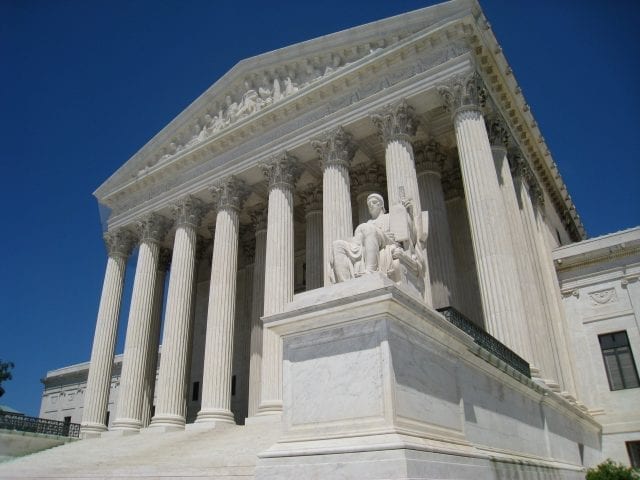United States vs. Sineneng-Smith started off as a fraud case–now it’s expanded into a First Amendment appeal.
The Supreme Court will consider whether encouraging illegal immigration is a protected form of free speech.
According to The New York Times, the case centers on a 1986 statute that criminalizes doing just that. In a ruling made last year, a circuit court judge struck down the rule unequivocally.
“The statute potentially criminalizes the simple words—spoken to a son, a wife, a parent, a friend, a neighbor, a co-worker, a student, a client – ‘I encourage you to stay here,’” Judge A. Wallace Tashima wrote in a unanimous decision for a panel of the U.S. Court of Appeals for the Ninth Circuit in San Francisco.
The case, notes the New York Times, is called United States v. Sineneng-Smith. It’s considered of the most significant immigration cases on the court’s docket, along with a reconsideration of President Trump’s decision to rescind the Deferred Action for Childhood Arrivals program.
The Supreme Court will also consider whether immigrants can challenge expedited removal orders in court.
However, Sineneng-Smith is different, in that it’s often characterized as an explicitly constitutional issue. First Amendment protections are one of a rare few issues that liberal and conservative justices tend to see eye-to-eye on.
As the N.Y.T. reports, the case is named after Evelyn Sineneng-Smith, an immigration attorney based out of San Jose, California. Sineneng-Smith made national headlines when an investigation found her charging undocumented immigrants—many from the Philippines—thousands of dollars to file applications for residency programs which had already been avoided by the federal government.
Sineneng-Smith knew the programs were no longer active, but charged her clients up to $6,800 each to prepare and submit paperwork.
She was later convicted of mail fraud and charged under the 1986 law for illegally encouraging her clients to stay in the United States. While Sineneng-Smith isn’t challenging the mail fraud conviction, she maintains she had a First Amendment right to file the applications.

But the New York Times notes that her argument isn’t exactly strong. In the past, the Supreme Court has found that “speech integral to criminal conduct” is not protected by the U.S. Constitution.
Nevertheless, Sineneng-Smith’s complaint changed as it moved through the judiciary. Once it hit the Ninth Circuit, advocates asked for another briefing—one to consider whether the 1986 law was overboard, impinging upon the First Amendment rights of people other than Sineneng-Smith.
That law, Tashima said, could be used to target Americans for a broad range of alleged offenses. A grandmother urging a grandchild to overstay a visa could be as easily prosecuted as an attorney working for an undocumented client. And the Times says it could even apply to public officials spearheading sanctuary city endeavors.
Writing for the 9th Circuit, Tashima said the examples her gave of potentially immoral applications “are not some parade of fanciful horribles.”
“Instead,” he said, “they represent real and constitutionally protected conversations and advice that happen daily.”
Solicitor General Noel J. Francisco has urged the courts to keep its focus narrow, conceding that the government has never taken “abstract advocacy of illegality” to be illegal in its own right.
“Just as a teenager does not aid, abet or solicit marijuana possession merely by saying to a friend, ‘I encourage you to try smoking pot,’ [a hypothetical grandmother would not violate the law] merely by saying to her grandson who visa has expired, ‘I encourage you to stay.’”
Despite Francisco’s stance, Tashima and Sineneng-Smith’s lawyers argue that the law should be challenged on the grounds that it could, someday, be used to assail First Amendment rights in less criminal contexts.
Sources
Is It a Crime to Encourage Unauthorized Immigration? The Supreme Court Will Decide


Join the conversation!